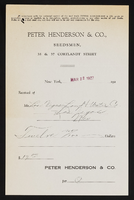Search the Special Collections and Archives Portal
Search Results

Meeting minutes for Consolidated Student Senate University of Nevada, Las Vegas, December 2, 1992
Date
1992-12-02
Archival Collection
Description
Includes meeting agenda and minutes.
Text
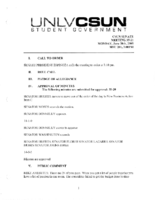
Meeting minutes for Consolidated Student Senate, University of Nevada, Las Vegas, June 20, 2005
Date
2005-06-20
Archival Collection
Description
Includes meeting minutes and agenda.
Text

Meeting minutes for Consolidated Student Senate, University of Nevada, Las Vegas, November 22, 1999
Date
1999-11-22
Archival Collection
Description
Includes meeting minutes and agenda.
Text

Interview with Philip Wymer Allen, August 26, 2004
Date
2004-08-26
Archival Collection
Description
Narrator affiliation: Meteorologist-in-Charge, Weather Bureau Research Station, Nevada Test Site
Text
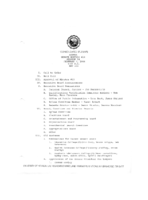
Meeting minutes for Consolidated Student Senate, University of Nevada, Las Vegas, February 7, 1984
Date
1984-02-07
Archival Collection
Description
Includes meeting agenda and minutes along with additional information about amendments to the senate bylaws. CSUN Session 14 Meeting Minutes and Agendas.
Text
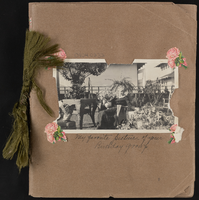
Helen J. Stewart birthday scrapbook
Date
1924
Archival Collection
Description
Helen J. Stewart birthday scrapbook
Mixed Content
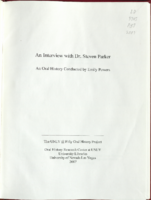
Transcript of interview with Dr. Steven Parker by Emily Powers, December 19, 2006
Date
2006-12-19
Archival Collection
Description
Dr. Steven Parker grew up and went to school in Connecticut. His parents were caterers and taught him a solid work ethic through example. His only sibling was finishing a post doctorate at Yale and had accepted a job at one of the Cal State schools when his life was tragically ended. Steven graduated from Assumption College in Massachusetts with a bachelor's in political science and got a scholarship to State University of New York at Albany. About hallway through his Master of Public Administration degree, the dean encouraged him to go on for his doctorate. He finished his PhD in 1971, and got a job at Western Illinois University which he started on September 15, 1971, the same day his son was born. Alter 8 years (and another child) in Illinois, Steve and his wife were ready to leave. He had attended a public administration conference in Baltimore in the spring of 1975, and was interviewed by Dina Titus and Tom Wright of UNLV. He had several other job offers, but UNLV looked like the best possibility, so he and his family moved to Las Vegas. Dr. Parker's title at UNLV was associate professor and department chair, although Dina Titus actually chaired the department his first semester here. He took over as chair in the spring of 1980. Steven started when Brock Dixon was interim chair, and has served under university presidents Leonard "Pat" Goodall, Bob Maxson, and Carol Harter. Today Dr. Parker teaches American Presidency and American government every semester, Natural Resource Policy and Political Corruption and Political Ethics once or twice a year, and occasionally teaches Urban Government. He also continues as the director of the University Forum Lecture Series, which was initiated by Tom Wright more than 23 years ago.
Text
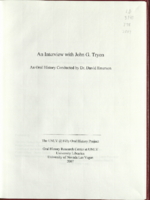
Transcript of interview with John G. Tryon by Dr. David Emerson, February 21, 2006
Date
2006-02-21
Archival Collection
Description
John G. Tryon was one of the early leading figures in the Engineering Department at UNLV. He grew up in Washington, D.C., the oldest of three sons. His father worked with the National Bituminous Coal Commission during the Depression and his mother was editor of the American Association of University Women's Publications. John went directly to University of Minnesota after high school graduation and earned a bachelor's in physics. During WWII he served in the Army Signal Corps and then went back to Cornell University to get his doctorate. His post doctoral work experience includes six years at Bell Telephone Laboratories, eleven years at University of Alaska, and six years at Tuskegee Institute. In 1974, Dr. Tryon interviewed at UNLV and was hired. The faculty carefully built up the curriculum, adding classes one at a time. John introduced a senior engineering design course modeled after one that pioneered at Dartmouth. He had also introduced this particular course at University of Alaska and Tuskegee. John was a member of the Academic Standards Committee at UNLV which helped set standards for academic probation and semester length. He has strong opinions on keeping engineering students who show promise and interest, and letting go of students whose academic strengths don't match the program. He believes students need to be matched to opportunity, be given the chance to find a niche that fits, and that they should not be given inflated grades or false hope. Dr. Tryon met his wife-to-be in Ithaca, New York, while attending Cornell University. His wife's mother, who was married to a botany professor, had invited him to Sunday dinner, something she had done for a number of students. John and his wife, who eventually became an English teacher, have two sons who grew to college age while they were in Alaska. Today they enjoy their church community, their family, and their circle of friends.
Text

Transcript of interview with Will Provance by David G. Schwartz, July 14, 2016
Date
2016-07-14
Archival Collection
Description
Will Provance was born in Mississippi and grew up mostly in St. Louis, where he earned his undergraduate degree at the University of Missouri before earning a Master’s in Business Administration from Shiller University. Provance would eventually attend the University of Nevada, Las Vegas where he earned a Master of Science in Hotel Administration. He started in the gaming industry as a pool manager at Sunset Station, where he would eventually become slot analyst before entering Station Casinos’ management development program. Provance then trained in various positions at Red Rock Resort prior to moving to Green Valley Ranch as a shift manager. He then went back to Sunset Station to become slot operations manager and was promoted to director of slots at that property. Provance is currently the director of VLT operations at Hard Rock Rocksino Northfield Park in Northfield, Ohio. Provance’s interview begins with his discussion of the various roles he has held in the gaming industry, including the types of duties he was assigned at the different properties. He then describes the difference between managing slot machines in his earlier positions and video lottery terminals (VLTs) in his current position in Ohio. Provance then mentions some of the mentors he has had in his career, and he describes what he believes are the qualities of both good and bad slot managers. He also discusses what he believes makes a good slot floor, including the process of working with slot vendors in getting new slot machines for the slot floor as well as working with other departments in the casino. Provance then talks about how slot operations has changed since he started in the industry and what he thinks the future of slot machines will be, specifically regarding skill-based gaming. The interview concludes with Provance’s discussion of his personal gambling and his advice to young people who want to go into the slot industry.
Text
Pagination
Refine my results
Content Type
Creator or Contributor
Subject
Archival Collection
Digital Project
Resource Type
Year
Material Type
Place
Language
Records Classification

